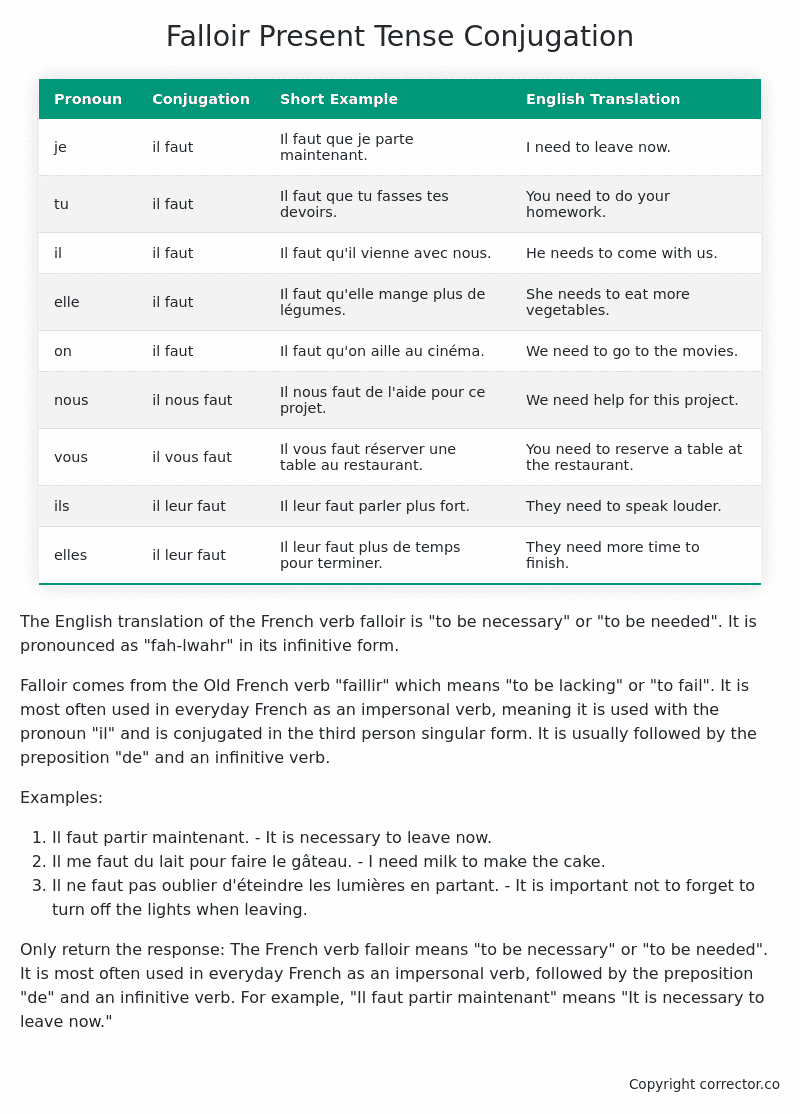Le Present (Present Tense) Conjugation of the French Verb falloir
Introduction to the verb falloir
The English translation of the French verb falloir is “to be necessary” or “to be needed”. It is pronounced as “fah-lwahr” in its infinitive form.
Falloir comes from the Old French verb “faillir” which means “to be lacking” or “to fail”. It is most often used in everyday French as an impersonal verb, meaning it is used with the pronoun “il” and is conjugated in the third person singular form. It is usually followed by the preposition “de” and an infinitive verb.
Examples:
- Il faut partir maintenant. – It is necessary to leave now.
- Il me faut du lait pour faire le gâteau. – I need milk to make the cake.
- Il ne faut pas oublier d’éteindre les lumières en partant. – It is important not to forget to turn off the lights when leaving.
Only return the response: The French verb falloir means “to be necessary” or “to be needed”. It is most often used in everyday French as an impersonal verb, followed by the preposition “de” and an infinitive verb. For example, “Il faut partir maintenant” means “It is necessary to leave now.”
Falloir – About the French Present Tense
To take a deep dive into all the French tenses then see our article on Mastering French Tense Conjugation.
Common Everyday Usage Patterns For Le Present
Interactions with Other Tenses
Table of the Present Tense Conjugation of falloir
| Pronoun | Conjugation | Short Example | English Translation |
|---|---|---|---|
| je | il faut | Il faut que je parte maintenant. | I need to leave now. |
| tu | il faut | Il faut que tu fasses tes devoirs. | You need to do your homework. |
| il | il faut | Il faut qu’il vienne avec nous. | He needs to come with us. |
| elle | il faut | Il faut qu’elle mange plus de légumes. | She needs to eat more vegetables. |
| on | il faut | Il faut qu’on aille au cinéma. | We need to go to the movies. |
| nous | il nous faut | Il nous faut de l’aide pour ce projet. | We need help for this project. |
| vous | il vous faut | Il vous faut réserver une table au restaurant. | You need to reserve a table at the restaurant. |
| ils | il leur faut | Il leur faut parler plus fort. | They need to speak louder. |
| elles | il leur faut | Il leur faut plus de temps pour terminer. | They need more time to finish. |
Other Conjugations for Falloir.
Le Present (Present Tense) Conjugation of the French Verb falloir (this article)
Imparfait (Imperfect) Tense Conjugation of the French Verb falloir
Passé Simple (Simple Past) Tense Conjugation of the French Verb falloir
Passé Composé (Present Perfect) Tense Conjugation of the French Verb falloir
Futur Simple (Simple Future) Tense Conjugation of the French Verb falloir
Futur Proche (Near Future) Tense Conjugation of the French Verb falloir
Plus-que-parfait (Pluperfect) Tense Conjugation of the French Verb falloir
Passé Antérieur (Past Anterior) Tense Conjugation of the French Verb falloir
Futur Antérieur (Future Anterior) Tense Conjugation of the French Verb falloir
Subjonctif Présent (Subjunctive Present) Tense Conjugation of the French Verb falloir
Subjonctif Passé (Subjunctive Past) Tense Conjugation of the French Verb falloir
Subjonctif Imparfait (Subjunctive Imperfect) Tense Conjugation of the French Verb falloir
Subjonctif Plus-que-parfait (Subjunctive Pluperfect) Tense Conjugation of the French Verb falloir
Conditionnel Présent (Conditional Present) Tense Conjugation of the French Verb falloir
Conditionnel Passé (Conditional Past) Tense Conjugation of the French Verb falloir
L’impératif Présent (Imperative Present) Tense Conjugation of the French Verb falloir
L’infinitif Présent (Infinitive Present) Tense Conjugation of the French Verb falloir
Struggling with French verbs or the language in general? Why not use our free French Grammar Checker – no registration required!
Get a FREE Download Study Sheet of this Conjugation 🔥
Simply right click the image below, click “save image” and get your free reference for the falloir Present Tense tense conjugation!

I hope you enjoyed this article on the verb falloir. Still in a learning mood? Check out another TOTALLY random French verb present conjugation!


